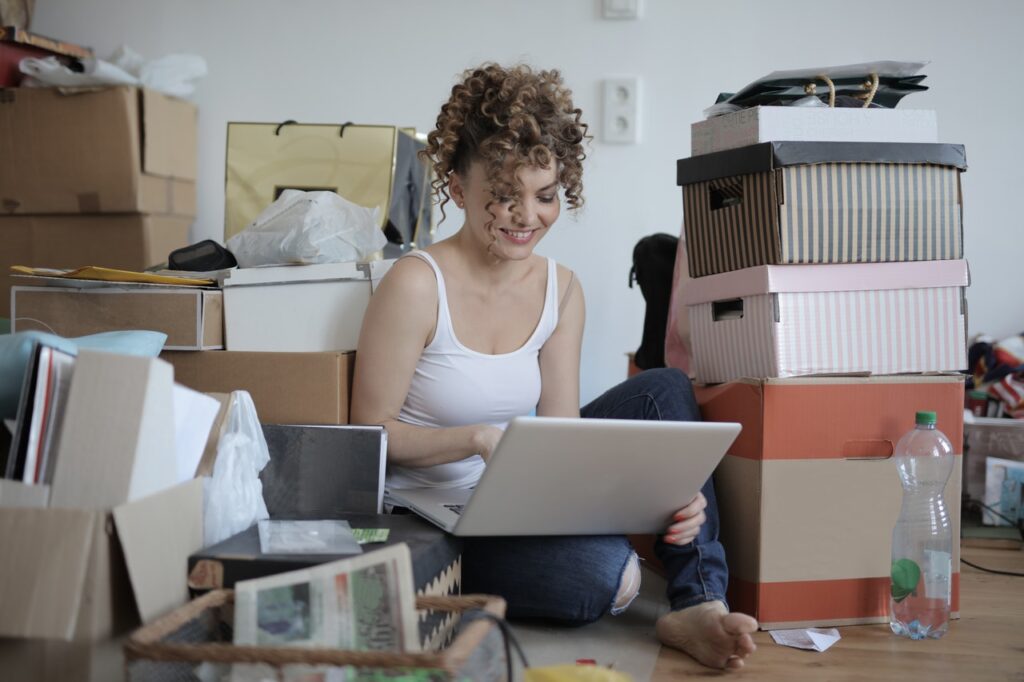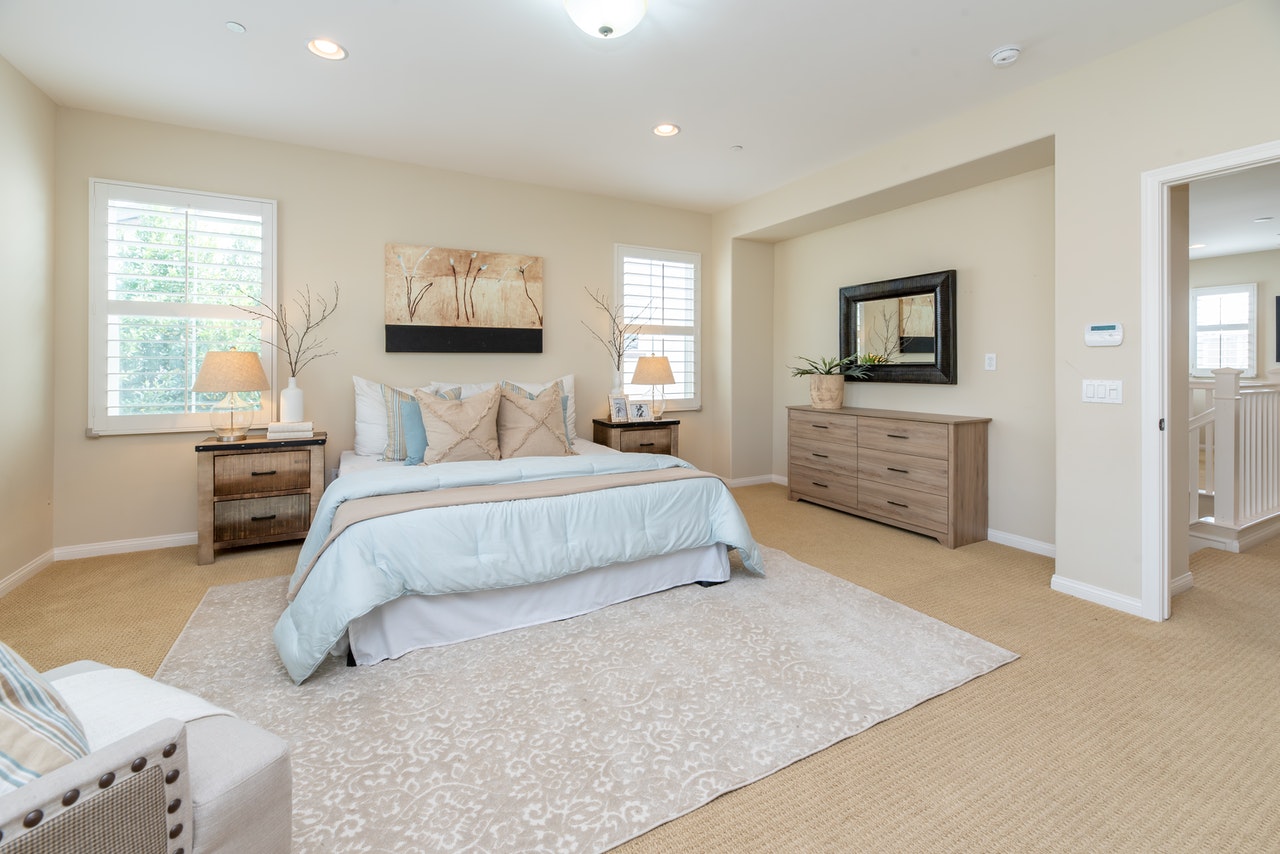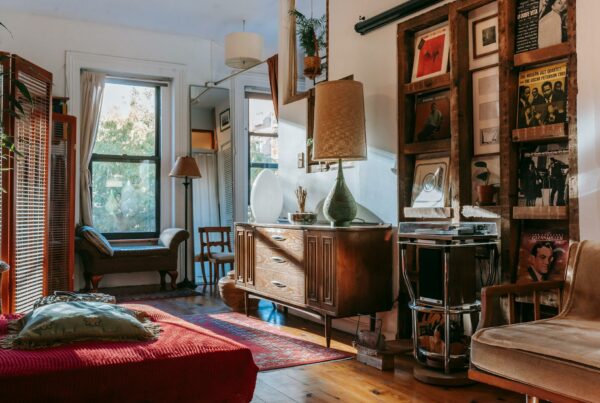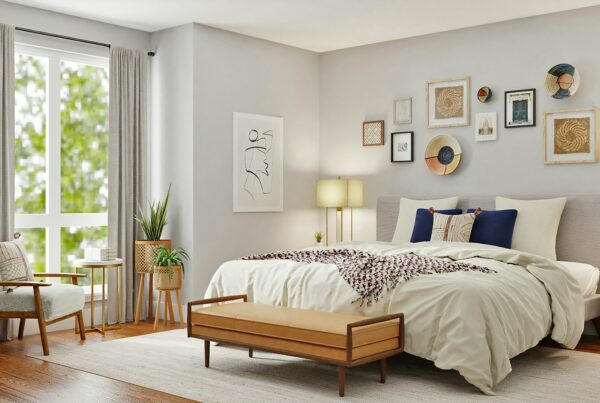Last Updated on November 18, 2022
Did you know we spend a third of our life in bed?
Primarily as we’re asleep, it turns out!
Since it’s substantially more time than you spend anywhere else, turning your bedroom into a storage facility just isn’t the best strategy.
An organized and clean bedroom creates a more peaceful and relaxing environment, letting you drift off into a peaceful slumber, uninterrupted. Furthermore, homeowners can also enjoy better health, improved mood, and stronger relationships.
The natural tendency to store items in our bedroom has been ingrained into us since we were children. Sure, it beats cramming them all together at the end of a hallway, but it can create an unpleasant space for both sleepers and guests alike. While many city dwellers pay for a regular cleaning service like a bond clean, doing it yourself can save a substantial amount of money.
The Big Declutter Challenge
If there’s one area of your home that you should be able to get a handle on, it’s your bedroom. Clutter can make any room feel smaller, but in the case of bedrooms, it can make them seem cramped and overwhelming. Not only does clutter make it harder for us to move around freely, but it can also be a massive distraction for our cognitive functioning.

Try these decluttering tips to get your bedroom in order:
Create a Vision and Identify its Purpose
It’s challenging to get started on decluttering if you don’t know where to begin. Determining your bedroom’s purpose will ultimately create a vision of how it should look and feel.
Ask yourself, is your bedroom a place to study or is it the perfect spot for snuggling with your significant other? Start by clarifying what your bedroom is used for, and then edit it based on that purpose.
For example, if your corner desk acts as a workspace, place textbooks or other study materials nearby for easy access during homework time. Alternatively, if your bedroom is strictly for sleeping, then having excessive furniture and clothes would just make things more cluttered.
Consider transferring your furniture elsewhere so that your bedroom is a place to sleep and nothing else.
Regularly Declutter Your Things
Decluttering is not something you do once or twice. It’s a process that needs to be done consistently if it’s going to have any impact on your space and peace of mind. Dedicate 30 minutes per week to the cause and ensure you have a recycling trash can, a container for out of place items, and a laundry bag.
Keep things you don’t use out of sight and sort the essentials when decluttering your things. You can purchase large plastic storage containers if your wardrobe cabinet is full, like a 5-tier cabinet for great shoe storage and more. But ensure you’re not hoarding many things in your bedroom. You can also get rid of things you no longer need by donating them to charity or putting them up for sale online or in a garage sale.
Once you have the essentials, proceed to follow these steps:
- Begin with your bedroom nightstands, dressers and desks as they’re typically the first to get cluttered. Gather and put away any paperwork, such as receipts or work files.
- Transfer and store any items that do not belong in your bedroom into your ‘catch all’ container. General places to look include closets, desk drawers and even under the bed.
- Throw away leftover food into your recycling bin – nobody wants rotting food stinking up the room!
- Check your closet for dirty clothes and place them in your laundry hamper. Proceed to return clean clothes to their closet or dresser.
- For your seasonal clothes or old bulky furniture, you could store them in a self storage unit. This will instantly make your room lighter and spacious.
Clean Your Bedroom Thoroughly and Efficiently
Now that you’ve managed to get a good grasp on decluttering, it’s time to deep clean. Before beginning, compile a list of tasks that need to be done and essential tools. Cleaning tools typically include rubber gloves, a vacuum and mop robot, cleaner with a soft brush attachment, mild dish soap or laundry detergent and a pet hairbrush. However, if you don’t have a vacuum cleaner, use brooms and dustpans as a substitution.
Clean Your Bedroom Surfaces
Bedroom surfaces are among the first things that accumulate dust, pet hair, and stains. If a nightstand is dusty, it can cause homeowners to have allergies and other respiratory illnesses.
Wipe down your dresser and nightstand with a soft, damp cloth or paper towel to ensure they’re clean and dust-free.
For stubborn stains on surfaces, consider using rubbing alcohol diluted with water, ammonia, baking soda or toothpaste to remove them.
Pay close attention to the cleaning agent you use for bedroom surfaces. Some cleaning agents might harm wooden cabinets, causing white marks and corrosion for metallic ones. So, read the cleaning agent’s usage instructions carefully.
Washing Your Clothes, Bedsheets and other Essential Things
Laundry is one of the most time-consuming chores, but it’s also among the simplest chores to do. While it can be challenging to find time in our busy schedules for laundry, doing so will pay dividends in the long run.
Follow these quick and easy steps to do your laundry more efficiently:
- Sort your dirty clothes and bedsheets into categories. Choose one at a time to wash, dry and fold.
- Wash bed sheets at least once per week and pillowcases twice a month. Serviceable items like towels should be washed regularly.
- Follow the product use instructions found on the label of the laundry detergent for optimal cleaning of your clothes, bedsheets, and other fabrics. Follow the number of scoops per kilogram of clothes or garments you wash.
- Wash windows and walls using a mild window cleaner and soapy, warm water, respectively. If you have dirty walls, it’s not necessary to hire a house painter to paint and hide stains. Turns out, cleaning your walls only needs to be done once a year!
Vacuum Your Bedroom Regularly
The vacuum is one of the most essential tools in a deep-clean. By regularly doing vacuuming your space, you’ll remove dust, pet hair and other allergens from your carpets before they have the chance to accumulate.
Start by vacuuming around all of your furniture pieces to get as much dirt off them as possible. To clean up any excess mess you make while doing so, try using a handheld vacuum cleaner with an attachment brush.
Afterward, move on to the floor. To ensure a thorough clean, run your vacuum cleaner over it several times in different directions and around corners. The more you do this, the better off you’ll be! Try to vacuum carpets at least twice a week. If possible, try cleaning the carpet in the evening after most foot traffic has taken place.
Are you a fur parent? Your dog or cat probably sleeps in your room. So, it’s advisable to vacuum your bedroom at least once every two to three days. Focus vacuuming in areas where your pet loves to stay. A deep, thorough room cleaning is a must at least once every month.
Proper Organization – The Finishing Touch
Once your decluttering and cleaning routine is set, it’s a simple case of organizing the items you have. Organizing can help save time when you need something, boost productivity and even reduce stress and anxiety.
Below are quick tips to make organization easy and effective:
- Create a designated place for anything you often use, such as keys or your wallet or phone.
- Organize your room into sections, such as a place to sleep, read and work.
- Place blankets on a rack, making them readily accessible to grab and use
- Label shelves and drawers with the contents they contain to avoid guessing.
So there you have it! By following these tips and tricks, maintaining a clean and decluttered bedroom is a breeze. Not only will your bedroom resemble a 4-star hotel room, but your health will improve as well!





